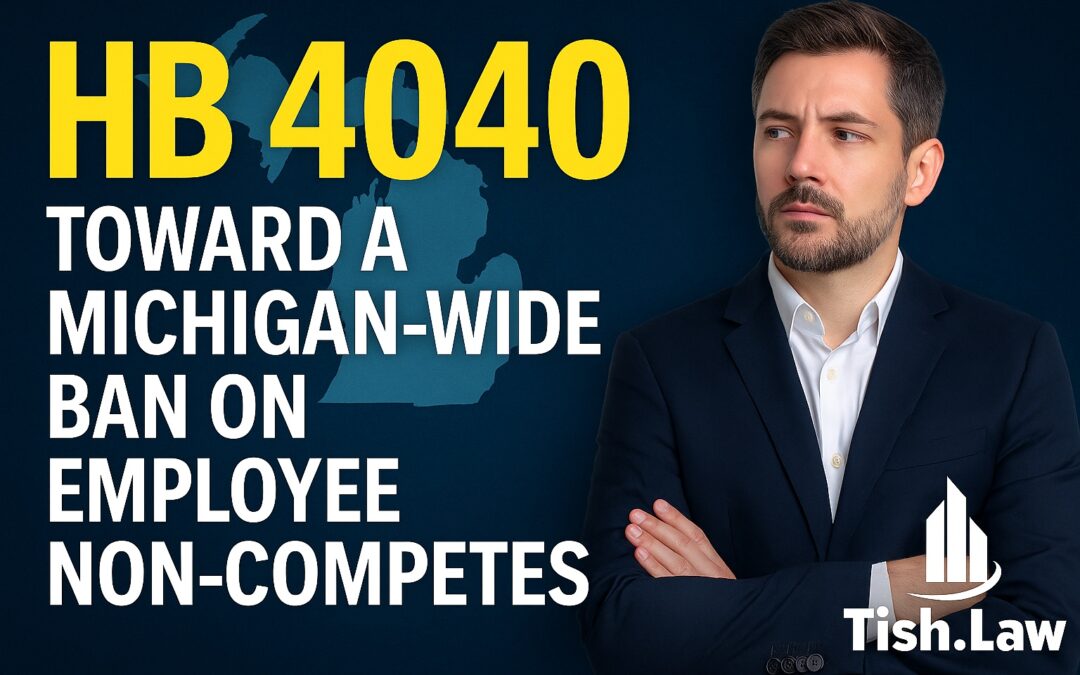Big changes are coming to Michigan’s non‑compete rules under House Bill 4040. Introduced on January 30, 2025 by State Rep. Denise Mentzer, the bill seeks to amend Michigan’s Antitrust Reform Act and would prohibit nearly all non‑compete agreements with workers — that includes employees, independent contractors, interns, volunteers, even apprentices.
Please note this blog post should be used for learning and illustrative purposes. It is not a substitute for consultation with an attorney with expertise in this area. If you have questions about a specific legal issue, we always recommend that you consult an attorney to discuss the particulars of your case.
Outside of rare situations where someone is selling business equity or the sale of substantially all business assets, every non‑compete — whether new or existing — would be void and unenforceable. That means not only future agreements, but also any current non‑competes could be effectively wiped out. Workers who face enforcement despite the ban could sue to recover their lost income plus attorney fees. The bill expands enforcement beyond individual lawsuits too, allowing class actions and banning arbitration clauses for non‑compete disputes.
HB4040 has cleared its first procedural hurdle in the Michigan House after being reproduced on February 4 and referred to second reading. It has not yet passed either the full House or the Senate.
If the bill advances through committee and receives majority support in the House, it would then move to the Senate. Estimates suggest it could reach the governor’s desk by late 2025 or early 2026, though timing will depend on legislative priorities and pushback from business groups.
Expert commentary notes that HB4040 is one of the strongest non‑compete restrictions in the country — potentially matching or exceeding protections in California, Minnesota, and North Dakota. With growing federal attention from measures like the Workforce Mobility Act and renewed FCC interest, Michigan’s action aligns with national trends aimed at expanding worker mobility.
Here’s what Michigan employers should do now: first, audit all current non‑compete and forum‑selection clauses — they may soon be rendered void. Second, for highly compensated employees, consider narrow non‑solicitation agreements that comply with any potential carve‑outs. Third, strengthen other workplace protections, including confidentiality, intellectual property assignments, and non‑disclosure clauses. Fourth, begin planning now for possible legal exposure — workers could sue as soon as the bill becomes law.
In short, HB4040 could dramatically reshape Michigan’s business landscape. If you’re an employer or HR professional, now’s the time to reassess restrictive covenants and update your legal playbook. Contact your legal counsel today to audit agreements, redesign policies, and ensure compliance in the bills may become law.
Contact Tishkoff
Tishkoff PLC specializes in business law and litigation. For inquiries, contact us at www.tish.law/contact/. & check out Tishkoff PLC’s Website (www.Tish.Law/), eBooks (www.Tish.Law/e-books), Blogs (www.Tish.Law/blog) and References (www.Tish.Law/resources).
Further Reading
- MICHIGAN’S NON-COMPETE DEBATE: BALANCING EMPLOYER AND EMPLOYEE INTERESTS – Ave Maria School of Law, https://www.avemarialaw.edu/wp-content/uploads/2022/02/Maslar-2019.pdf
- Non-compete Contracts: Economic Effects and Policy Implications – Treasury Department, https://home.treasury.gov/system/files/226/Non_Compete_Contracts_Econimic_Effects_and_Policy_Implications_MAR2016.pdf
- The Freedom to Leave – Center for American Progress, https://www.americanprogress.org/article/the-freedom-to-leave/
- Without Noncompete Agreements, Can Employers Keep A (Trade) Secret?, https://digitalcommons.wcl.american.edu/cgi/viewcontent.cgi?article=1209&context=aublr
- Is a Ban on Non-Competes Supported by Empirical Evidence?, https://ir.lawnet.fordham.edu/cgi/viewcontent.cgi?article=1539&context=jcfl

